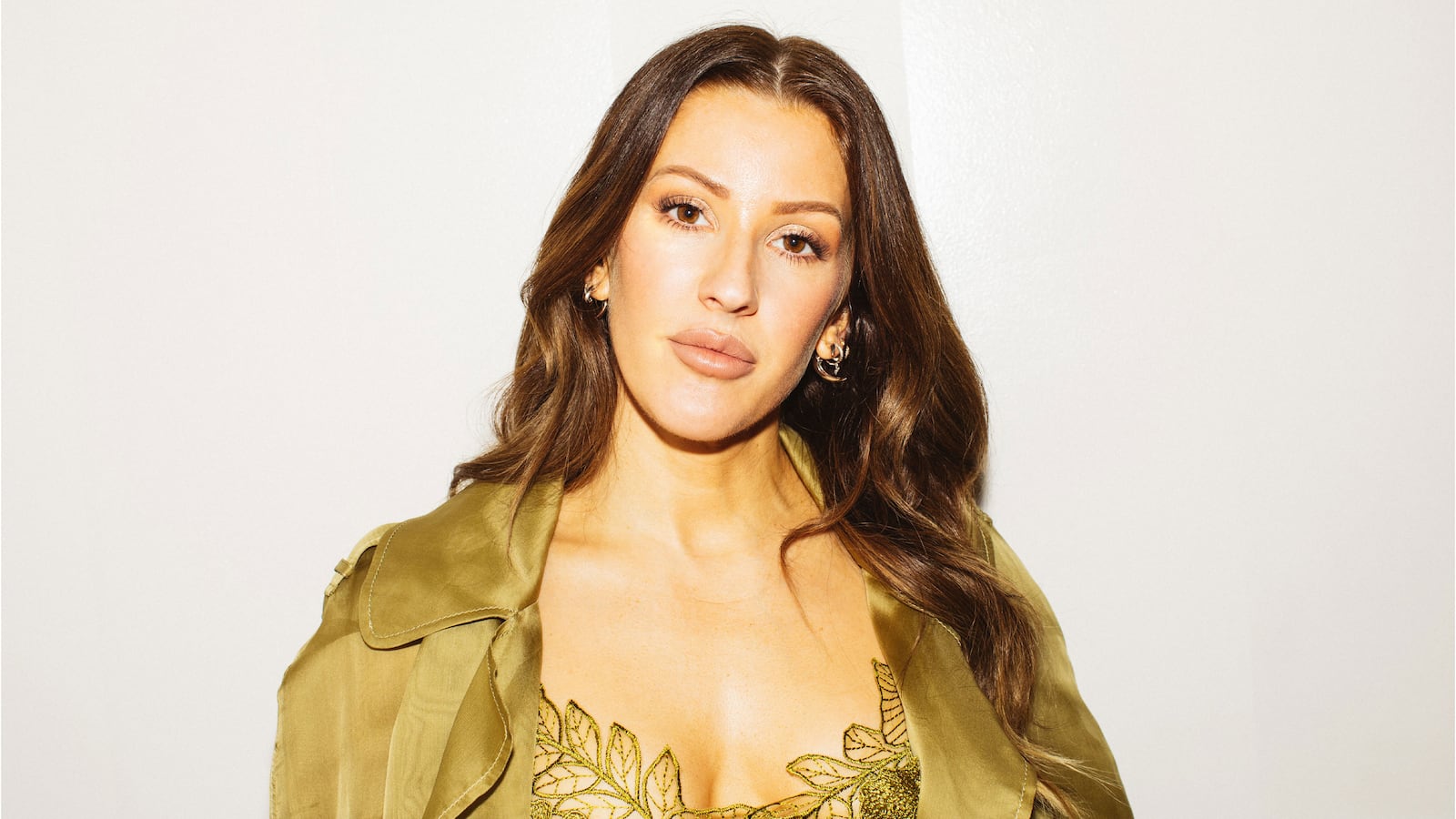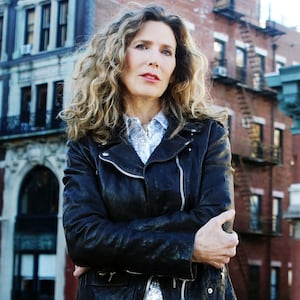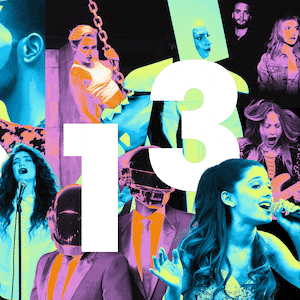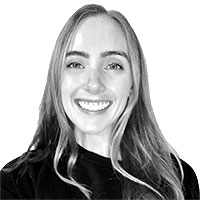With all due respect to the pop stars who drum up fan frenzy by peppering their songs with autobiographical Easter eggs—like Olivia Rodrigo’s “Driver’s License” or Miley Cyrus’ “Flowers”—Ellie Goulding has just one request when you listen to her new album: Don’t think, just dance.
“It’s not meant to be overanalyzed or over-interpreted,” the British singer-songwriter says of her fifth studio album, Higher Than Heaven, out this Friday. “It’s just meant to be enjoyed.”
It’s a Monday afternoon in March, the day after Goulding, 36, glammed it up for Vanity Fair’s infamous Oscar party. Today, however, she’s curled up on the sofa of her West Hollywood hotel room, wearing oversized sweats and speaking pensively about what this album—her freest, most fun, and, yes, least personal one yet—has meant to her.
“It is a real escape. And I need it. Maybe I’ll come back down to earth at some point, but I’m not up for that right now.”
Goulding—who became a household name in the U.S. thanks to a string of hits in the early-to-mid-2010s, including “Lights,” “Burn,” and “Love Me Like You Do”—started working on Higher Than Heaven in early 2021, right after the COVID lockdown and in the middle of her pregnancy (she and her husband, Caspar Jopling, welcomed a son named Arthur that April). Coming off a more emotionally heavy album, 2020’s Brightest Blue, and craving a return to performing, she decided to let loose with a collection of songs that deliberately skirt tabloid and TikTok analysis by emphasizing feeling over narrative, à la Dua Lipa’s Future Nostalgia.
Goulding sings about the electricity and intoxication of love on dance floor fillers like “Midnight Dreams,” “By the End of the Night,” and “Higher Than Heaven.” Even the more chill-sounding cuts, like “Waiting for It,” “Just 4 You,” and “How Long,” find her humming with the thrill of escaping herself, if only for a night. Conveniently, that ebullience extends to the recently released “Miracle,” her third collaboration with Calvin Harris, which brings ’90s trance to a new generation.
Below, Goulding speaks with The Daily Beast about her acting ambitions, a possible collaboration with Charli XCX, what she really thinks of her album Delirium, and lots more.
I will never go to the Vanity Fair Oscar party, so I need to know: Is it as fun as it looks?
It looks really glamorous on the carpet and you get in there and it’s just like, now what? I actually met some really interesting people, like a few writers and producers, so it’s not just the actors and musicians. I don’t know, sometimes I feel like I’m not meant to be there or something. But it’s nice to be in a room of creative people. I’m a bit of an introvert and I don’t usually go out that much, but when there’s something like this, I have to just shake that off a little bit.
So you don’t necessarily gravitate to all the musicians in the room?
No. I saw Finneas, which was nice. We’ve been meaning to do something together for a while and it was the first time we properly met, so that was nice. And then I met… I can’t even remember. It was a late one.
After meeting all those people, do you think you’d ever do something in the Hollywood world? Is that an ambition for you?
Well, when I was young, I wanted to act. I remember, you know at school when you had to write down what you want to do when you get older? I always wrote down “actress.” I don’t know where it came from. I did a few school plays and things, but that was kind of it, so I ended up just channeling it through my voice and guitar and songs, and the acting never happened. And it’s strange because that’s really, really, really all I wanted to do when I was a kid. So, I have been working with someone for the past couple of years. The main thing really was to get me out of my shell a bit as a performer, but actually, it’s kind of turned into something else. I’ve been recording a few tapes and things of different characters and some of my favorite parts from films and TV, mostly comedy.

Like for auditions?
I haven’t done an audition yet. Maybe. We’ll see. I don’t know where it will take me, but I would love to write with someone. My dream thing would be some kind of female-driven dark comedy, surrounded by lots of women. I loved Bad Sisters. I loved Fleabag. And I loved this series called Nighty Night with Julia Davis. Phoebe [Waller-Bridge] must have been influenced by Julia—she has a big cult following with female actors and comedians in the UK.
Well, I hope that one day I can ask you a million questions about acting because that sounds promising, but we’ve got to get to this album. Every day there’s a different song that’s stuck in my head. Today it’s “Cure for Love.”
Thank you! Yeah, I like that one. These songs, I don’t really know where they came from. All I can say is that myself and the guys I write with—Anthony Rossomando, Tom Mann, and Andrew Wells—we came out of lockdown a bit desperate to feel some kind of normality and to not be down about what had just happened to us all. So our natural instinct was not to just sit down and write our feelings, but to come up with these big, upbeat songs.
Yeah, so much of this album screams joy and escapism to me.
I’ve always got an urge to make people feel better. I’m a big empath, according to my therapist. And even when I write ballads, I always offer a kind of conclusion or a solution to what someone might be going through or what I’ve been going through. Or I try and bring it back to me and say, oh, maybe I’m the problem. Which actually is probably true half the time; half the songs are written about guys and I maybe put too much on them. I’ve had a lot of time to reflect on my past relationships.
But this album was not that. This album was, I just wanted to make a dance record. I think I’ve just got the fever for wanting to play live and play festivals and go on tour, because it really is the thing that keeps me sane. I am going to be dancing on stage. I want to be moving the whole time, I want to be feeling that joy. So it’s as much for me as it is for my fans. I really, really, really look forward to touring. It’s not about the adoration side of seeing fans night after night. It’s just a good feeling. I don’t get anxiety when I’m on stage. I truly love to sing. And these kinds of songs are just songs that make me feel so full of joy, and yeah, it is a real escape. And I need it. Maybe I’ll come back down to earth at some point, but I’m not up for that right now.
That joy that clearly permeates this album—can any of that be chalked up to this being the first album you’ve made completely after getting married and having a baby and, I’m assuming, feeling more settled in your life? Did any of that translate into you feeling like you had more freedom in your music?
I think this album genuinely has no connection to my personal life, which is so refreshing, because every other album… even songs on Delirium have been deeply connected to stuff that’s going on with me. It’s honestly so nice to play songs that aren’t about anyone, that give me a kind of sense of freedom and escape. And the escape is really just for myself. I struggle with anxiety, it’s sort of been debilitating at times. And you know, motherhood has been a journey and it’s all new, and new is scary. Change is scary. I’m sure there’ll be another album that’s going to come—I’m not in that space yet—about motherhood. Because at the same time as going into lockdown, I stopped performing, I got pregnant. And then I had Arthur, and he’s brought me the greatest joy. But then my anxiety came back from when I was a kid. So lots of things happened all at once. And I think I’ve earned, at this point, the right to make an album that I really want to enjoy performing and something that is not as heavy as the other stuff, so I can just sing it and enjoy singing it.
So for this one, you probably won’t have to deal with people trying to annotate every lyric and find the deeper meaning inside of them.
Yeah, there’s no point in doing that with this album. Other albums, yes. Brightest Blue, yes, interpret all you want. But this? No. This is just meant to be enjoyed. Except “Better Man,” maybe. God, it felt good to sing that song and write that song. Just being able to say out loud, “I’m the better man.” There was something going on at the time, something in the press or something around me that involved some kind of misogyny. I can’t remember what it was exactly. And it’s just nice to feel quite powerful when I sing that song. I’ve only sung it live a few times, but it felt very good.
What is that one about?
It’s just about being a powerful woman. Like, “I’m soft as a shadow and strong as the drink I like.” It’s a statement of power, like, don’t fuck with me. I always loved that Cher clip [where] she’s on a [talk show] and she’s just like, “I’m really nice, I’m really sweet, but if you fuck with me, I’ll wipe the floor with you.” I think we’ve had to play that role as women, of being the nice person and not to be over-emotional and not to be too angry. And my rule—and it always has been, in my job and beyond—is kindness always. I don’t know what someone’s going through. I come from a humble background, and I will never forget the people that helped me and that I was shown such kindness. So that’s something I always go with. But then it’s very hard as a woman, especially in industries like this, there have been moments where you do have to exert your power a bit and not take any shit. And I think that song was kind of in that moment.

And that was written directly in response to something in the news about you?
Yeah, I can’t remember what it was. But it was me and another female [songwriter], and we were just angry about something. It was probably five years ago that I wrote that.
I can totally appreciate you not wanting to write songs that beg some kind of deep analysis. At the same time, your press notes for this album begin by strongly highlighting the BMI Award for songwriting that you won last year, which you clearly felt really proud of. Before that, did you feel like people didn’t appreciate your songwriting, or that your writing was overlooked?
Yeah, maybe, maybe. I’m just really proud to have written all the songs that I’ve written. And maybe not everyone knows that I write the songs or that I spend so much time on them or that I spend so much time in the studio. Since I had Arthur, you know, I’ve obviously had other priorities. But before Arthur, I was in the studio almost every day, and people hear like, two percent of all the songs I write. And UK press, especially… there is a fascination with what’s behind the music and what’s behind the songs and the fascination with my personal life, with my relationships, my family, my background. So the focus just constantly gets taken off what’s important. And I get that being a musician and being in the public eye comes with other stuff. It comes with being photographed and people wanting to know what you had for breakfast and who you’re with and who your friends are. I think it was just a UK thing—I never really got it [in the U.S.]—where it just felt like I’d been kind of slightly forgotten, or not regarded, necessarily, as a songwriter.
I always wondered if it was ever frustrating that “Love Me Like You Do,” which has got to be one of your biggest hits, was one of the very few that you didn’t write yourself.
I know. Yeah, but I can’t be too mad about that because I recorded that song for eight hours. It was my first song working with Max Martin directly. And that process to me was worth the song not being mine, because it was a process, whether I wrote it or not. And I sing that song like it’s mine, and I feel like I’ve earned the song as being my song now. But I always have to give credit to Tove Lo, who helped write it, and Max and ILYA. It’s genius, that song. There’s probably about 50 voices doing the [background vocals] and the chorus. It’s so cool.
Is that what made it take eight hours, doing all the backing vocals?
Most of those were already done, but yeah, I added a bunch. And no, just the vocal had to be very specific, like Max Martin-specific. That in itself is a hell of a job to get that right. So I’m proud of that moment and that song, and I had no idea it was going to be as big as it was, to be honest.
You did a couple interviews a few years ago where you were asked about Delirium and you said that you thought it was a great pop record, but not necessarily an Ellie Goulding record. I wondered…
I’d take that back. I don’t know why I said that. I think I was just being down on myself that day. Because it’s a really fucking good pop album. I think it was just that there were a couple of tracks that I put on there because I wrote them with great writers, but that doesn’t always make a good song. It doesn’t always make a song that is true to you and authentic to you. But when I listen back to some of those songs, I’m like, actually, that’s a really, really good pop album. And I did it dirty by saying that. But I also think it’s OK to look back on an album and be like, I don’t like this song as much anymore. You know, I’m evolving and changing all the time, changing my taste, and would I write those songs now? Definitely not. But at the time, I loved those songs. There were just a few on there that perhaps weren’t as true to me as they should have been.
Were they not true to you at the time, or can you only say that in retrospect?
That’s a really good question. I would say probably at the time, but I was just ignoring my instincts. Because I thought these songs should be on the album because they’re big-sounding songs and I was just so hyped up off my second album doing so well. I was like, I’m in L.A., I feel like this is what I should be doing at this point. But it’s not to say the songs aren’t good pop songs. It’s just maybe some of them shouldn’t have been Ellie Goulding songs.
When you were talking about occasionally feeling frustrated by the press and things like that, it made me wonder, do people in this industry talk to each other or vent with each other about that kind of thing? Is there a support system?
No, I’m really going at it alone at the moment. But it’s my fault. I’m really shy. I was chatting to Charli XCX last night and whenever I see her I make a point of saying I’m such a big fan, because I am. I just love that she’s just always been true to herself and completely authentic, and she’s a great songwriter and a great pop artist. I always say that to her when I see her. But at the same time, I’ve never felt part of a clique of singers. Charli’s done songs with Christine and the Queens and Caroline Polachek, and I’m obviously big fans of them both, and I’m like, are you guys all hanging out somewhere that I don’t know about? Because I’ve always been a bit shy of that stuff. I guess I always think, oh, they wouldn’t want to work with me. That’s my imposter syndrome kicking in, I think. But also, I’m not at parties, I’m not at communal studios. So I think it might really be a case of just not bumping into people, as opposed to there’s some kind of, like, forum of female artists who all chat to each other and come up with collaborations and ideas and things. I think it’s just me not putting myself out there enough because I’m shy, I’m introverted. But I’ve done all right by myself.
You should call up Charli for a song!
I would love to do a song with Charli. Honestly, I would. We’re gonna write together, that’s what we decided last night. Caroline, I’d love to do a song with because I feel like vocally it’d be really interesting. And then I love Tems, I love Snoh Aalegra, and I love this singer called Wet, she’s got an amazing voice.
At the same time, are you aware that everyone on the internet wants you to make a song with The Weeknd? Especially on the video of you singing “Miracle” in the church, there are so many comments that are like, “She sounds just like The Weeknd!”
Yes! I’ve always thought I sounded a little bit like The Weeknd in moments. I think we’ve kind of got a similar tone and some similar influences. We used to message back in the day because I think he sort of took note of that too. I did a cover of one of his songs, “High for This,” years ago. And I think he maybe recognized that as well. I’ve used my voice in so many different ways, and it was nice for Calvin to bring back that side of my voice—the kind of soft, ethereal side—which I haven’t been using as much lately.
Speaking of Calvin, any chance you’ll be joining him at Coachella this year?
I couldn’t possibly say. Who knows?
Earlier you mentioned where you could see yourself going for the next album, possibly one that covers motherhood. Are you constantly writing, or do you have to set that aside when you’re doing new album promo and things?
At the moment, not so much. Sometimes I do this thing that is so masochistic where I open my computer and go through all my old emails from, like, 2010, and I go through all my old lyrics and then I listen to the songs that are still on my computer from then. It’s just such a two-drinks-deep thing to do, and I start trying to get inspiration from that. Which I do—I feel like that era of troubled relationships and when my career started, so much was happening that I can always take inspiration from that. And it’s annoying because therapy and mindfulness and all that stuff teaches you to be in the moment. But then as a songwriter you’ve got to be in the past or be worrying about the future. That’s where I feel like a lot of my lyrics come from. I don’t know, maybe I need to change tactics with how I write and write about something a little different. But yeah, you sometimes have to be in a not good place to write the best lyrics, which is quite frustrating.
Did you do that at all for this album?
No, this album was quite easy to write in that I didn’t have to overthink it too much—but then obviously I’d go home and start overthinking them and then come back and change the lyrics. But no, I think I’m saving that for the next album, starting now. These lyrics were just in the moment, with the music, and I don’t know what else I can say about them, really.
This interview has been edited and condensed for style and clarity.



